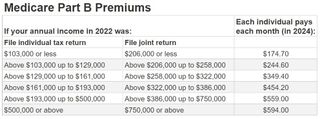How a Roth Conversion Can Spare You From Medicare’s IRMAA and Taxes
If you've been a good saver and face large required minimum distributions (RMDs), then you need to plan for how to head off or limit higher Medicare premiums.


How does it feel to know that some people will pay less for Medicare coverage than you do, but you will all get the same benefits?
It can be tough to understand, especially when you have been a diligent saver over the years, have worked hard to accumulate what you have and have really embraced the “millionaire next door” concept. Meanwhile, another person, possibly paying less for the same coverage, did not work as hard as you over the years and was not as much of a diligent saver as you.
Unfortunately, paying a higher price tag doesn't get you better coverage when it comes to IRMAA and Medicare premiums.

Sign up for Kiplinger’s Free E-Newsletters
Profit and prosper with the best of expert advice on investing, taxes, retirement, personal finance and more - straight to your e-mail.
Profit and prosper with the best of expert advice - straight to your e-mail.
Let's first explain what IRMAA is and how this all works together. IRMAA stands for “income-related monthly adjustment amount.” It’s an add-on cost that some Medicare Part B and Part D beneficiaries may be required to pay. The chart below outlines what 2024 Medicare Part B premiums will cost based on income. You can see that the more you earn, the more your Medicare coverage costs you.

Remember that this chart goes back two years, so the income you have when you are 63 will determine your costs when you turn 65. So, for example, let's say that you sold a business at the age of 63. Then, at age 65, you would have to pay the consequence of that, so that's why it's important to be aware of your income starting as soon as 63 — even though you're not on Medicare yet. The good news is that you can appeal and request a redetermination, especially if you’ve had a life-changing event, such as lowered income due to retirement.
Dealing with a retirement tax bomb
Our goal for most of the clients we work with is to keep them in that first tier, so they have to pay only the $174.70. This can be tough, considering that we primarily work with people who have been diligent savers and are likely to have high required minimum distributions (RMDs) that they must take when they turn 73 or 75.
We call this a retirement tax time bomb because RMDs, combined with your Social Security and, potentially, a pension, may force you into higher Medicare tiers as time goes along. Our clients get good news, though, because we are able to help them plan for this.
We do this with strategies to help lower their income when the time comes. One popular strategy that many people are looking into right now is a Roth conversion, in which you move money from your tax-deferred investment to your tax-free investment.
For example, let's say you have a traditional IRA. You can convert some or all of it to a Roth IRA and pay the taxes now. Why would you want to do that? Because taxes are lower now than what we expect them to be in the future.
If you are 63 and younger, then the planning is a bit cleaner for you since you don't have to worry about Medicare premium increases when doing the Roth conversions. If you are 63 or older, then you need to be careful. We’re often asked if it makes sense to convert knowing that we will have to pay more in Medicare premiums now. This is not always smart to do, but you have to ask yourself: Would you rather pay higher Medicare premiums during a shorter amount of time or defer this problem to the future and have to pay increased Medicare premiums for potentially the rest of your life? Many of our clients prefer to pull the bandage off quickly rather than bringing on pain slowly over time.
What if Medicare premiums rise?
Something that really concerns me is that the cost of Medicare is likely to rise in the future. Why do I think this? Because it has generally risen steadily over the last 20 years, and it's projected to continue rising. This means that people will be paying more for Medicare as their retirements continue. It also means that the income tiers shown in the chart above could go even lower, making more people subject to income-related adjustments, making it even more important to ensure lower income in retirement, when it means the most.
My last thought on IRMAA: Do not lose the majority of your Social Security benefit as you progress throughout retirement. As most of us know, Medicare premiums are taken out of our Social Security payments. With the cost of Medicare continuing to increase, those who are in the higher income tiers may find themselves without any Social Security check left. In fact, they may actually have to pay the government above and beyond their Social Security benefit to cover their Medicare costs.
Also, keep in mind that Social Security cost-of-living adjustments (COLAs) have not kept up with inflation or rising Medicare costs over time, which makes this even more of a concern. Why work for 40 years, pay into a system and then not see the rewards? The good news is that there are ways you can preserve your Social Security check and ensure that you maximize your retirement savings — and make your money last as long as you do.
The appearances in Kiplinger were obtained through a PR program. The columnist received assistance from a public relations firm in preparing this piece for submission to Kiplinger.com. Kiplinger was not compensated in any way.
Related Content
Get Kiplinger Today newsletter — free
Profit and prosper with the best of Kiplinger's advice on investing, taxes, retirement, personal finance and much more. Delivered daily. Enter your email in the box and click Sign Me Up.

As Founder and CEO of Peak Retirement Planning, Inc., Joe Schmitz Jr. has built a comprehensive retirement planning company focused on helping clients grow and preserve their wealth. Under Joe’s leadership, a team of experienced financial advisers use tax-efficient strategies, investment management, income planning and proactive health care planning to help clients feel confident in their financial future — and the legacy they leave behind. Joe has also written two books, I Hate Taxes (request a free copy) and Midwestern Millionaire (request a free copy). You can find Joe on YouTube by clicking here, where he creates educational videos for those in or near retirement with $1M or more saved. If you would like to talk to Joe’s team, you can schedule a call by clicking here.
-
 Machine Learning in Finance: Real-World Applications and Challenges
Machine Learning in Finance: Real-World Applications and ChallengesControlling machine learning in a finance environment requires stakeholders' commitment to creating a strong ethical foundation.
By Clay Bethune Published
-
 How Caregivers for Adults Can Save on Taxes in 2025
How Caregivers for Adults Can Save on Taxes in 2025Tax Breaks Caring for your parent or spouse can be stressful, but the IRS offers tax breaks for qualifying taxpayers. Here they are.
By Kate Schubel Published
-
 How Building Liquidity Into Your Retirement Plan Can Pay Off
How Building Liquidity Into Your Retirement Plan Can Pay OffTo succeed in investing for retirement, you need time and discipline — liquidity can give you both.
By Samantha Compton, IAR Published
-
 Striking Oil in Opportunity Zones: Now Might Be the Best Time to Invest
Striking Oil in Opportunity Zones: Now Might Be the Best Time to InvestYou could unlock hidden wealth in QOZs with strategic oil and gas investments, potentially combining tax advantages with long-term growth in an essential industry.
By Daniel Goodwin Published
-
 What You Don't Know About Annuities Can Hurt You
What You Don't Know About Annuities Can Hurt YouLack of awareness leads many to overlook these potent financial tools, and with the possibility of running out of money in retirement, that could really hurt.
By Ken Nuss Published
-
 Three Keys to Logical Investing When Markets Are Volatile
Three Keys to Logical Investing When Markets Are VolatileFocusing on these market fundamentals can help investors stay grounded rather than being swayed by emotion or market hysteria.
By Dennis D. Coughlin, CFP, AIF Published
-
 Yes, the Markets Are Spooked, But You Don't Have to Be
Yes, the Markets Are Spooked, But You Don't Have to BeIt's human nature for investors to freak out in a downturn. But with a little discipline, you can overcome the urge to sell and stay focused on long-term goals.
By Jimmy Lee, IAR Published
-
 Remembering Bogle: A New Standard for Municipal Investing
Remembering Bogle: A New Standard for Municipal InvestingImprovements in technology, data, systematic trading and risk analytics have led to more successful municipal indexing.
By Paul Malloy Published
-
 Winning Strategies for Financial Advisers as Clients' Lives Evolve
Winning Strategies for Financial Advisers as Clients' Lives EvolveHow can the wealth management industry help make life transitions easier for the adviser and the client?
By David Conti, CPRC Published
-
 How Advisers Can Establish Relationships With HNW Prospects
How Advisers Can Establish Relationships With HNW ProspectsThese strategies can help to build influence with high-net-worth individuals, who are often looking to an adviser for insight rather than solutions.
By Jeremy Green, CFP®, CTFA, CLU®, CEBS®, AEP®, EA, MSFS Published